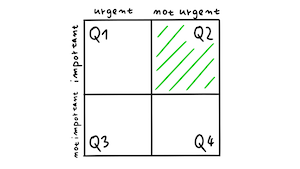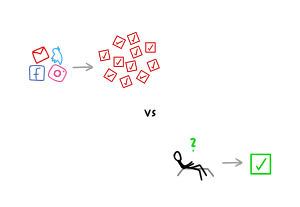How gamification improved my productivity
Hi, this is Mat, one of the two co-founders of Deprocrastination.
Today, I want share an ongoing productivity experiment that's already showing an immense impact on my life and productivity. And not only mine but also my best friend’s.
A few weeks ago, my best friend and I started talking and both realized how we’re not pushing ourselves to our limits. From the age of 16, we’ve always been big into self-development and becoming a better version of ourselves.
Whenever I asked myself in the past:
“Am I better version of myself than half a year ago?”
I could always honestly respond:
“Yes, without a doubt. I’m better, smarter, physically stronger, and kinder to others than 6 months ago.”
Well, this fall was the first time in the last 9 years when I had to say something different. I was a worse version of myself than in the spring of this year, or even the fall of 2018.

Why did this happen?
I see a few main reasons:
I went abroad for the first half of the year and traveled a lot. While traveling is fun and brings you a lot of great experiences, it's also detrimental to your habits and routine.
I realized that a steady daily routine (→ progress) is better and more satisfying for me than the novelty of traveling. But I also became complacent and less ambitious because I’ve got almost everything I want.
Also, when doing research about procrastination, I figured out that I should be kinder to myself. However, kind doesn’t mean soft and I became soft.
I was getting things done, but I wasn’t progressing in life as much as I wanted. And my best friend had similar thoughts. We started thinking and came up with two things that worked well in the past.
1. Accountability
A few years ago, we sent a daily progress summary email to each other every evening. It worked. It motivated us to do things, because you simply didn’t want to write that you had done nothing.
2. Competitiveness
In 2014, we started using Memrise to learn new vocabulary. You can see your friends progress in Memrise. Well, it developed into a competition who would gain more points that day. I got to 120 days of an unbroken streak, studying vocabulary at least 30 minutes a day.
And the best part? We never said that we were competing.
My various previous efforts on how to gamify my life had failed, but all of them were shallow. So I thought that accountability and competitiveness could be the two missing pieces to make it finally work. And I was right.
How did we gamify our lives?

One of the reasons why games are so addictive is that you can clearly see your progress.
You have a number (score) and you can compare yourself to other people. Life has something similar like money and power but these things don’t have the immediate feedback required to be engating enough.
You don’t get money or power for meditation. You don’t get money for taking a cold shower or studying. At least right now.
Instead, my friend and I created our own score.
Imagine, you have a list of activities you get points for. For example:
- Meditation for 10 minutes +1 point
- A cold shower in the morning +2 points
- Deep and quality work for 1 hour +1 point
- An hour of studying +1 point
But you can also lose points:
- Drinking more than one unit of alcohol -1 point
- Visiting social media before evening -1 point
The list can be ever-expanding but we only decided to track things that are meaningful to us. Of course, we wanted to track every little thing, but that would overload us quickly and we might abandon the whole system.
Here's an example list of activities and points:

Then we set up a spreadsheet where we can track our progress. Google Drive was the easiest choice. Both of us have their own sheet we activities.

Let's take a look at how a spreadsheet for a person new to this system might look like. Let’s call this person John.
Say John decided to hit 50 points. It’s his first week, so he has no clue whether it is too much or too little.
- On Monday, he wakes up on time, doesn’t meditate but gets some solid work done (don’t forget - only deep work counts: coding, writing, drawing, and designing).
After work, he goes to the gym and takes a cold shower. That’s another 2 points for him.
When he gets home, he decides to study for an hour (+1).
After all of this, he fills out the form (0.5 for him) and gets 7.25 for the first day, calls it a day, then takes a look at his friend’s list and sees he scored 9. It’s not a competition, right? - On Tuesday, he wakes up before 7 a.m. (1.5 points), and decides to bring it on. He isn’t going to lose again and goes into a cold shower in the morning (something he hasn’t done in a while because it’s so unpleasant on a cold winter morning). But it’s 2 points for him and that’s what counts.
He gets into a long flow session at work and gets 4.5 points for deep work.
He doesn’t go to the gym today and instead goes home to study a topic that caught his attention yesterday.
He decides to count his progress and he's over a whopping 10 points. He feels good. - The next day, he doesn’t wake up on time, but he takes a cold shower and meditates.
- ...
The days go on and on and he doesn’t have trouble going into the cold shower in the morning, because of not only a good feeling, he also gets valuable 2 points that get him to beat his best friend.
This system helps you more clearly measure your progress and know if you're winning or losing. Let's take a look at some finer details.
What about weekends?
Some people don't want to be bothered on the weekends but that’s when most of our shallowly ingrained habits fail.
We still want to enjoy the weekends but also don’t want to lose all our progress over the weekends. We decided that points are doubled over the weekend and you can’t get negative points.
Note: the system is changing on a weekly basis. We see things that don’t work well and adjust them. We try to make these adjustments carefully so we don’t just game the system, but actually benefit from it. If we start abusing no negative points during weekends, we might simply change that.
For example: in the beginning, we had a daily maximum. After hitting the cap, you couldn’t get more points. It was there to stop us from overworking and burning out. However, we found out that didn't work for us, so instead we changed it into a daily minimum. Before you hit the daily minimum, the workday isn’t over.
When is the workday done for you?
- After the daily minimum is hit. Then you can continue if you want to, but if you don’t feel like it, no problem.
- After you’ve been working for 12 hours.
How often do you adjust the system?
Weekly. We call each other on Sunday to change the rules. Daily adjustments could be used to game the system.
How to progress over time, while keeping the system useful?
We had two ideas in mind. First, reduce the amount of points you get for certain activities, but we didn’t like that because it wouldn’t show us how we progressed over time (total points would stay the same).
Instead, we decided to increase the daily minimum and the weekly goal. It allows you to see how much better you become. At the beginning, we had problems hitting 10 points per day, now we can breeze through it.
What to do about cheating?
It’s self-tracking, of course we can cheat. But we simply don’t, otherwise there is no point to the system.
If you adopt it, be honest with yourself and with your best friend.
How to create your own productivity game
If you're feeling like this could help you push yourself a little more, and get moving forward, you can create your own version of this system.
How?
- Find someone you know, who also wants to make more progress
- Make a list of activities that matter to you
- Assign a point positive value to them (based on how hard they are for you)
- Make a list of activities that are bad for you
- Assign negative point value to them
- Set a daily minimum (8-10 points) and a weekly goal (like 50 points)
- As you go about your day, record when when you do something productive or unproductive
- At the end of the day, record everything in the spreadsheet and see how you're doing compared to your friend
That's the basic system.
Bonus rules:
- Schedule weekly calls to adjust the system.
- Stop working when you hit your daily minimum, or after 12 hours.
- Double positive points & no negative points on the weekends.
That's it. It's not complicated once you get into it.
Try it as an experiment for a week and see if it helps you understand more clearly when and how you're making progress!


